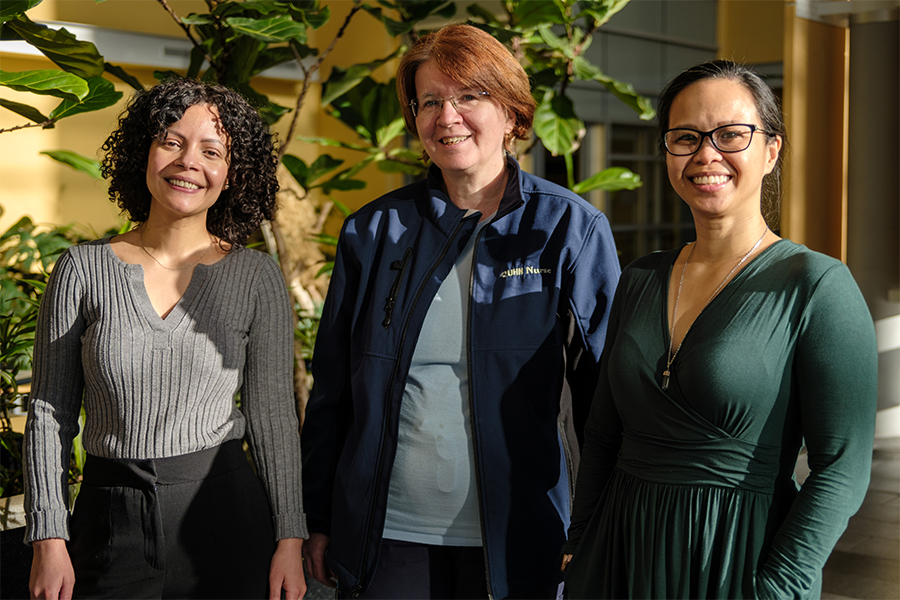“IMPACT is a program of last resort for patients with the most serious and complex mental illnesses,” says Patricia Melville, (L), coordinator, IMPACT Unit, University Health Network’s Centre for Mental Health, with Dr. Daniel Rosenbaum, a psychiatrist with the unit. (Photo: UHN)
For two decades, UHN’s IMPACT Unit has been a critical safety net for some of the highest needs mental health patients. Housed in offices on College Street above a café devoted to board games, the program delivers around-the-clock psychiatric and social support that allows patients to live in and be part of the neighbourhood, not housed away in mental health facilities.
Patients in the program have a severe and persistent mental illness (SPMI) – predominantly schizophrenia, which is characterized by psychosis and disorganized thought and behaviour. They experience alternating periods of acute distress and stability and often have a history of numerous inpatient admissions.
A typical patient may hear violent or upsetting voices, spend little time with others and be unable to work. Their financial decisions may be made for them by the Office of the Public Guardian and Trustee. What money they have is directed towards rent, often in shared rooms in lice-ridden or bed bug-infested boarding houses. They struggle with hygiene and may have experience with substance abuse, homelessness or violent behaviour.
“These are people who have had significant challenges maintaining relationships with care providers,” says Dr. Daniel Rosenbaum, a psychiatrist with the unit since 2020. “They have treatment-resistant illnesses – even with consistent support from our team many continue to experience distressing symptoms.”
Wednesday, Jan. 26, is the annual Bell Let’s Talk Day, an opportunity to break the silence around mental illness and support mental health across Canada.
However, that support must be in many forms because, when it comes to treatment, there is no “one-size-fits-all” plan for everyone – unlike with some other illnesses. Patients with SPMI have multiple and complex needs and benefit from the intensive outreach-based care provided by IMPACT, which allows them to live independently and safely in the community.
The name IMPACT incorporates the acronym for Assertive Community Treatment (ACT), a highly integrated approach to community mental healthcare used throughout North America. This model views care as extending beyond medical treatment to include interdisciplinary services that enhance quality of life, increase access to basic necessities and reduce the likelihood of re-hospitalization.
ACT was developed in the 1970s and came out of the deinstitutionalization movement. It aims to create a “hospital without walls,” providing patients living in the community all the services they would receive in an institution.
Act as a surrogate family to patients
The result is a continuum of care spanning from medical services to social services such as assistance finding housing, help managing finances, connecting with community programs; and even exceptional services that include accompanying clients to funerals, watching pets when they are in the hospital, organizing walking groups. IMPACT has even reconnected a patient with their brother who had been looking for him for 30 years and assumed that he was dead.
“Our clinicians act as a surrogate family to patients who often have few meaningful social connections in their lives,” says Dr. Rosenbaum.
But IMPACT never wants to create a system of dependence. Individualized care plans take into consideration the level of functioning for each of their more than 80 patients. Some are capable and encouraged to live with greater independence, while others require more support for basic needs.
The interdisciplinary team is composed of psychiatrists, social workers, nurses, occupational therapists, peer support workers and community health workers. Team members collaborate on all of the unit’s clients.
Patient developments are discussed daily and the team works with others within and outside the mental health system, often serving as the primary point of contact for patients in their navigation of the health system.
Arranging appointments for this patient group is a challenge. Many live in poverty and don’t have access to a phone or a computer. Their conditions often make communication difficult. IMPACT visits patients in their residences, in shelters and on street corners if they can’t make it to the office.
“It can be challenging to work in the community in some of the places that we go – the boarding homes with bed bugs, the times when inappropriate comments are directed towards you (not necessarily from our patients),” says Patricia Melville, IMPACT’s coordinator.
“But if you’re not doing at least 75 per cent of your visits outside the office, you aren’t doing ACT.”
Arranging COVID-19 vaccination appointments for patients
A social worker by training, Patricia had one patient who had difficulty keeping regular appointments. Through acquaintances she tracked him down to a local library and eventually turned that location into a regular meeting space.
“He had lost everything,” she says. “I was able to work with him in the library and started with what he wanted most, which was getting ID and then housing.
“It felt like I was giving him a life back.”
The depth of the relationships between clinicians and clients has shone through during the pandemic. IMPACT arranged COVID-19 vaccination appointments for their patients and were extremely proud to achieve vaccination rates comparable to that of the general population.
IMPACT has had to find novel ways of operating during the pandemic to keep people connected and ensure they receive optimal care. Many group-based activities for patients have been cancelled and other community groups have reduced services.
“One theme we’ve noticed through COVID from our clients is they are lonely,” says Patricia, citing the increased use of IMPACT’s after-hours pager by patients. Generally used for crisis calls, the pager line now often provides supportive listening and de-escalation for patients in distress.
“These kinds of contacts are really key for preventing a worsening of people’s mental health that might lead to a crisis, an ED visit, or an admission,” says Dr. Rosenbaum.
Recently, staff shortages due to COVID meant the team didn’t have a nurse on-site to provide anti-psychotic injections. A refresher training session was quickly coordinated so that psychiatrists and a resident could administer patient treatment.
“I’m really proud of our team because they are undaunted by things,” says Patricia. “The work we do in helping patients who are marginalized and vulnerable can be very satisfying.”
Bell Let’s Talk Day
Here are some of the opportunities on Wednesday across UHN to promote mental health and wellness:
- Breathing is one of the fastest and easiest ways to calm down the nervous system in the moment and activate a calming response. Let UHN Psychiatrist-in-Chief, Dr. Susan Abbey, help you through a breathing exercise in this video
- “Let’s Talk About Anxiety” is a virtual health talk with tips on how to manage anxiety and advice on how to support loved ones with anxiety. It runs from 1:00 p.m. to 2:00 p.m. on YouTube and is part of UHN’s Patient and Family Education monthly series. Read more about the session and register

- The team at Krembil Research Institute has planned a week’s worth of activities, including a Kindness Kudoboard to acknowledge or celebrate those who have shown kindness; a “comfort food” cookbook; a list of UHN Wellness Workshops; and a talk by Dr. Robyne Hanley-Dafoe on “finding resilience.”



